On November 1, with autumn in full bloom, there was a small concert held in a small rice paddy in the Garakgol neighborhood of Noonsa-dong, in Gwangmyeong-si, Gyeonggi-do (Gyeonggi Province).
Kim Back-keun, a rice farmer in the area, played host to the Nondureong Concert, using one of his own rice paddies as the outdoor venue. During the show, the farmer sang about his life as a farmer, a job he has had for 27 years, in front of many people, both from the community and from across the nation.
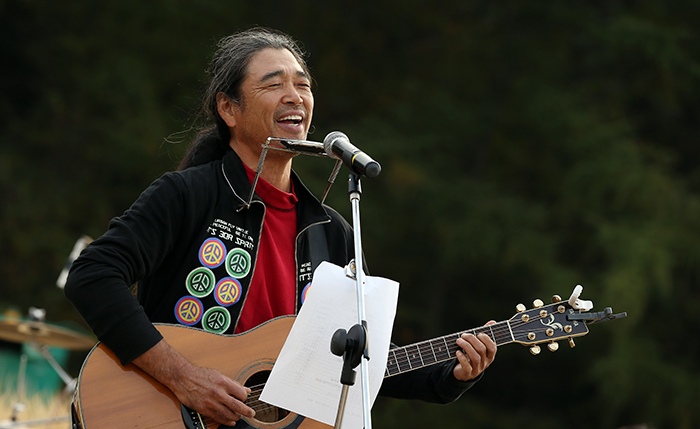
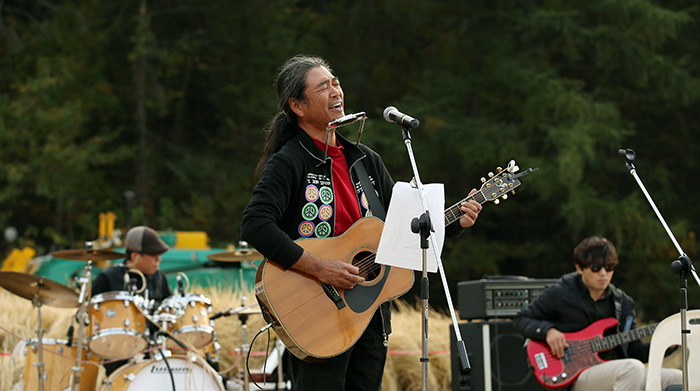
Kim is known as the “singing farmer.” He held his fall concert for the second time, the first having been held last year. The rural concert began with melodies played on a violin, the emblematic instrument of classical European music.
Following were a series of songs all composed by the farmer himself. He sung about the pain of life itself and of living as a farmer, and also about the gifts he has received in return for his farming efforts.
Sounds from a bass guitar, a classical guitar and traditional Korean instruments, such as the two-stringed violin-like haegeum and the 12-stringed zither, the gayageum, were added to his vocals, uplifting the atmosphere and augmenting the autumn vibe.
As for the history of the singing farmer, Kim was a member of the quite-well-known Seoul rock band Foreigner. When the group disbanded 27 years ago, he was forced to go back to his hometown and start rice farming with his wife and mother.
Carrying on the six-generation family business, Kim even developed his own rice brand, “Kim Back Keun’s Count Rice.”
While running the family business over the past 27 years, however, the farmer never gave up on his innermost passion for music.
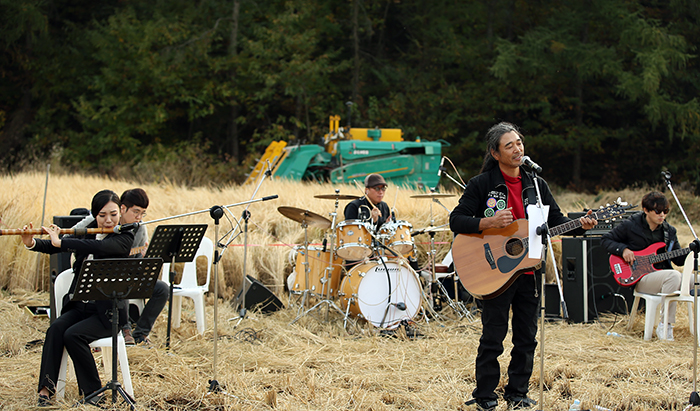
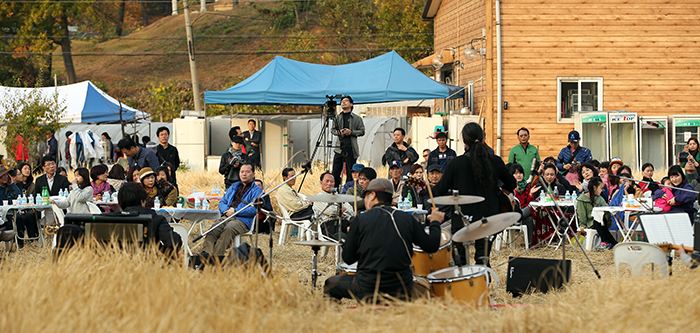
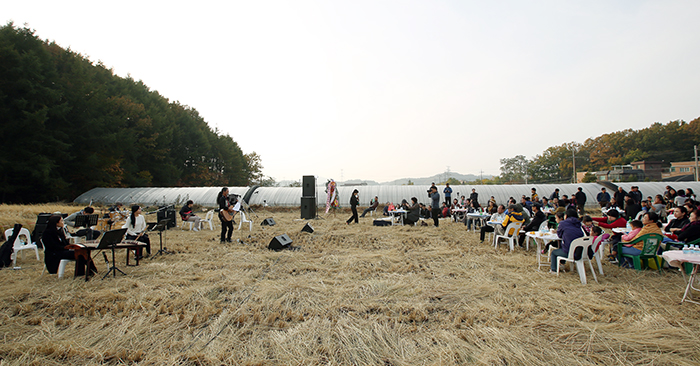
His diehard passion finally brought him to the point where he built his own studio, covering the walls of a run-down house with egg crate foam for soundproofing. There, he self-studied composition and has produced two albums of his own.
He came out with his first album in 2009, titled “Messages from the Soil,” and in 2013 his second one, “Ray,” was released.
Kim wrote and composed most of the songs on the two albums. He sings about the importance of soil, growing rice in it and farming in general, as well as about his own life path.
“Before I became a farmer, I didn’t know what rice could bring to my life. I realized that if I didn't eat, I couldn't move or live. Now, when I feed myself rice, I always feel grateful. In that sense, my songs embody the feeling of gratitude for what I eat,” said the farmer.
* Interview with Kim Back-keun
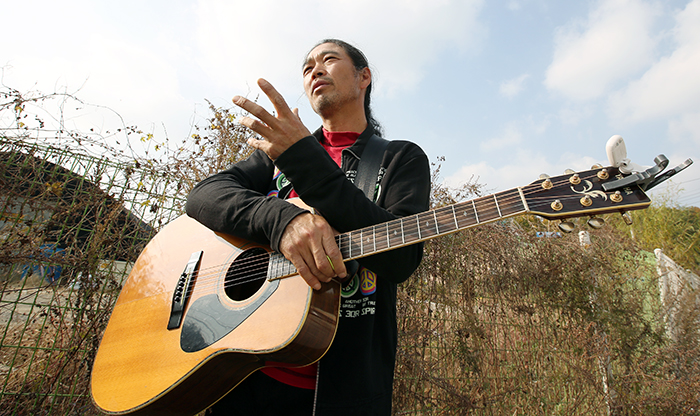
- You farm during the day, and at night you pick up a guitar and sing. When did you start singing?
I think it started when I was a middle-school student. When I was in my 20s, I was in the music industry, part of the rock band Foreigner, for three years. We had our differences and the conflicts forced us to disband.
I had no choice but to join my family business, rice farming, to make a living. It’s been 27 years since I arrived here. I studied, all by myself, how to compose and practiced singing and playing the guitar whenever I had time.
- What was it that kept you pursuing your dream of being a singer?
It’s passion. All I got was the ceaseless passion for music and I never stopped singing and playing the guitar. As I got older in my 20s and 30s, the depth of my music ability deepened. Also I came to the realization that whether or not someone recognized me and my music, it is the best thing for me to keep bringing out my story and expressing myself through music.
- You must have faced some opposition from your family. There must be a reason that, nonetheless, you just followed your heart.
Their opposition was really strong. They even tried to break my guitar. I just stuck to my guns, though. Then, I had already made up my mind to follow my dream to the end. I was so determined to do anything to continue my music, I was even ready to die for it.
Even though I was not that famous, it was happiness and the greatest delight in my life to just do my music. I think this is the beginning. I’d like to show more with my music.
- You’ve released two albums. You compose and write most of the songs. What messages are in the songs?
Some of the songs embrace the pure spirit of farmers, farmers who don’t want anything and just live, producing from nature what they eat. I tried to put this very pure spirit into my songs. I also sing about rice, my family conflicts and the battles in our lives. I also warn against those who only pursue wealth and materialism. Finally, my songs deliver the lesson of “co-existence” in which each and every individual, no matter how strong he or she may be, should live together and help each other.
- The idea of holding a concert in a rice field is quite interesting. How did you come up with this idea and what do you expect those who come to see your concert to get from it?
All the proceeds from the concert go to charity. With the proceeds, I buy bags of rice from farmers here and give them away to charities.
Like this, I organized this concert to help those in need, and at the same time, I want to give those who gather here to see my performance the chance to tread on the paddy, to smell the grain growing, to look up at the clear blue sky and to look back on themselves in a peaceful state. I hope they will build new, good memories or look back on their good old days while here.
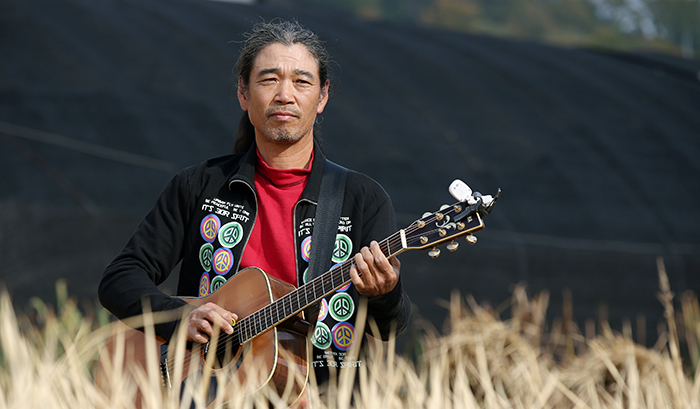
- We heard that you intend the concert to deliver a message of peace. Tell us about what a world with peace might look like.
Most importantly, a world with peace stems from our peace of mind. If there were no serenity in the mind, your world and your life would never be happy and could only be miserable.
Peace in your mind leads to peace in the world, I believe. When many people get the message and they do honestly have only peace in their mind, then the whole world would become peaceful.
- If you ever want to challenge new things in your life, what would they be?
Musically, I continue to keep myself out of the comfort zone. I paid for my two albums by growing and selling fresh farm produce. I will continue to scrape up more money to create more songs.
- What does music mean to you? What does farming mean to you?
Music gives us the most valuable, most sacred and most honest life lessons. We can feel happy and sometimes feel sorrow as we listen to music. From music, we also become aware of something else. A world without music might suddenly become boring and meaningless. Each single melody comes together to make the world more joyful and more delightful place in which to live.
Farming is the most basic, original and most precious industry for human beings. Not many people know how important farming is to their lives. They cannot live without food. They must appreciate its value.
By Sohn JiAe
Korea.net Staff Writer
Photos: Jeon Han
jiae5853@korea.kr
Kim Back-keun, a rice farmer in the area, played host to the Nondureong Concert, using one of his own rice paddies as the outdoor venue. During the show, the farmer sang about his life as a farmer, a job he has had for 27 years, in front of many people, both from the community and from across the nation.


Singing farmer Kim Back-keun gives an outdoor concert on his own land in the Garakgol neighborhood of Gwangmyeong-si in Gyeonggi-do on November 1.
Kim is known as the “singing farmer.” He held his fall concert for the second time, the first having been held last year. The rural concert began with melodies played on a violin, the emblematic instrument of classical European music.
Following were a series of songs all composed by the farmer himself. He sung about the pain of life itself and of living as a farmer, and also about the gifts he has received in return for his farming efforts.
Sounds from a bass guitar, a classical guitar and traditional Korean instruments, such as the two-stringed violin-like haegeum and the 12-stringed zither, the gayageum, were added to his vocals, uplifting the atmosphere and augmenting the autumn vibe.
As for the history of the singing farmer, Kim was a member of the quite-well-known Seoul rock band Foreigner. When the group disbanded 27 years ago, he was forced to go back to his hometown and start rice farming with his wife and mother.
Carrying on the six-generation family business, Kim even developed his own rice brand, “Kim Back Keun’s Count Rice.”
While running the family business over the past 27 years, however, the farmer never gave up on his innermost passion for music.



The singing farmer holds his Nondureong Concert in his own rice field, evidencing that, for him, work and art are inseparable.
His diehard passion finally brought him to the point where he built his own studio, covering the walls of a run-down house with egg crate foam for soundproofing. There, he self-studied composition and has produced two albums of his own.
He came out with his first album in 2009, titled “Messages from the Soil,” and in 2013 his second one, “Ray,” was released.
Kim wrote and composed most of the songs on the two albums. He sings about the importance of soil, growing rice in it and farming in general, as well as about his own life path.
“Before I became a farmer, I didn’t know what rice could bring to my life. I realized that if I didn't eat, I couldn't move or live. Now, when I feed myself rice, I always feel grateful. In that sense, my songs embody the feeling of gratitude for what I eat,” said the farmer.
* Interview with Kim Back-keun

Despite strong opposition from his family, singing farmer Kim Back-keun never gives up on his passion for music.
- You farm during the day, and at night you pick up a guitar and sing. When did you start singing?
I think it started when I was a middle-school student. When I was in my 20s, I was in the music industry, part of the rock band Foreigner, for three years. We had our differences and the conflicts forced us to disband.
I had no choice but to join my family business, rice farming, to make a living. It’s been 27 years since I arrived here. I studied, all by myself, how to compose and practiced singing and playing the guitar whenever I had time.
- What was it that kept you pursuing your dream of being a singer?
It’s passion. All I got was the ceaseless passion for music and I never stopped singing and playing the guitar. As I got older in my 20s and 30s, the depth of my music ability deepened. Also I came to the realization that whether or not someone recognized me and my music, it is the best thing for me to keep bringing out my story and expressing myself through music.
- You must have faced some opposition from your family. There must be a reason that, nonetheless, you just followed your heart.
Their opposition was really strong. They even tried to break my guitar. I just stuck to my guns, though. Then, I had already made up my mind to follow my dream to the end. I was so determined to do anything to continue my music, I was even ready to die for it.
Even though I was not that famous, it was happiness and the greatest delight in my life to just do my music. I think this is the beginning. I’d like to show more with my music.
- You’ve released two albums. You compose and write most of the songs. What messages are in the songs?
Some of the songs embrace the pure spirit of farmers, farmers who don’t want anything and just live, producing from nature what they eat. I tried to put this very pure spirit into my songs. I also sing about rice, my family conflicts and the battles in our lives. I also warn against those who only pursue wealth and materialism. Finally, my songs deliver the lesson of “co-existence” in which each and every individual, no matter how strong he or she may be, should live together and help each other.
- The idea of holding a concert in a rice field is quite interesting. How did you come up with this idea and what do you expect those who come to see your concert to get from it?
All the proceeds from the concert go to charity. With the proceeds, I buy bags of rice from farmers here and give them away to charities.
Like this, I organized this concert to help those in need, and at the same time, I want to give those who gather here to see my performance the chance to tread on the paddy, to smell the grain growing, to look up at the clear blue sky and to look back on themselves in a peaceful state. I hope they will build new, good memories or look back on their good old days while here.

Kim Back-keun, who runs the family farm by day and sings by night, says that he will continue with his musical career by saving up more money and by selling radishes, cabbages and other produce that he grows.
- We heard that you intend the concert to deliver a message of peace. Tell us about what a world with peace might look like.
Most importantly, a world with peace stems from our peace of mind. If there were no serenity in the mind, your world and your life would never be happy and could only be miserable.
Peace in your mind leads to peace in the world, I believe. When many people get the message and they do honestly have only peace in their mind, then the whole world would become peaceful.
- If you ever want to challenge new things in your life, what would they be?
Musically, I continue to keep myself out of the comfort zone. I paid for my two albums by growing and selling fresh farm produce. I will continue to scrape up more money to create more songs.
- What does music mean to you? What does farming mean to you?
Music gives us the most valuable, most sacred and most honest life lessons. We can feel happy and sometimes feel sorrow as we listen to music. From music, we also become aware of something else. A world without music might suddenly become boring and meaningless. Each single melody comes together to make the world more joyful and more delightful place in which to live.
Farming is the most basic, original and most precious industry for human beings. Not many people know how important farming is to their lives. They cannot live without food. They must appreciate its value.
By Sohn JiAe
Korea.net Staff Writer
Photos: Jeon Han
jiae5853@korea.kr